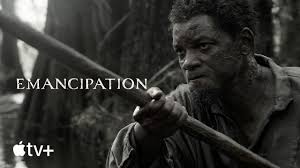
Film Review: “Emancipation” Shows Racism Triggered by Whites’ Ignorance, Inferiority Complex
“Emancipation” is one of the recent movies recounting the evil of slavery in the United States. Released in 2022, the movie mirrors the dying days of slavery and the struggle for freedom of millions of blacks enslaved in different plantations across the Souther part of the country which culminated in the American Civil War between 1861 and 1865. The movie, based on a true life story, centres around the courage, resilience and native intelligence of a slave, “Whipping Peter” who defied all odds to escape from a labour camp in Clinton to arrive at Union encampment in Baton Rouge where he enlisted in the army to fight slave owners defying the pronouncement of Abraham Lincoln which abolished the practice.
Played by Will Smith, Peter, an Haitian, owned by Captain Lyons, was separated from his family—wife and two children—and was taken to labour on the construction site of a rail track in Clinton supervised by Jim Fassel (Ben Foster), the biggest slave hunter at the time. Broken by the separation from his family and dehumanising experience from slave owners, Peter’s motivation is to reunite with him family. Very conscious of his ‘liberty’ as a human, the smouldering guns of the whites is the only wall between him and rebellion.
To reflect the inhumane treatment of the blacks by the whites, the decapitated heads of blacks, who attempt to escape from slave owners, are hung and used to line the streets. Infractions, disobedience or any show of weariness attracts flogging, maiming or outright killing. They are transported in cages and are paraded as owned animals whose fate is solely controlled by their “owners”. It is this mentality that makes Fassel tell Peter “I’m your God. You walk the earth because I let you. You are my dog now.” “Perhaps you will give me some of the fine meat you gave your other dog,” Peter replies wittily to suggest that dogs are treated better than blacks.
In an attempt to detach them from their roots and erase their identity, biblical or English names are given and they speak in the language of the owners. It is why Peter asks one of his colleagues “what do they call you?” “Thomas”, he replies. One of man’s greatest assets is the consciousness of his identity. It is man’s pride and compass! Despite his harrowing experience, he refused to be broken; he holds on to his African values to fights off mental domination.
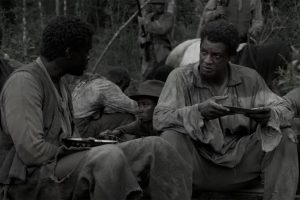
His courage to stair a rebellion on the construction site after eavesdropping the conversation of two white men on Lincoln’s abolishion of slavery underscores his determination and mental alertness fueled by the urge to reunite with his family. He also asks Thomas “Do you have a family, Thomas, a wife, someone to think about…mama?” In the midst of the rebellion he stirred, he and three other persons escaped including Thomas who was later shot by Fassel. The three; Peter, John and Gordon escaped into the woods to head for Baton Rouge. After Lincoln’s pronouncement there were two categories of slaves; those who staged a rebellion while the other category simply waited till Federal forces arrived to declare them free. Peter was among the former!
“Emancipation” takes the audience through the role of identity consciousness in the liberation of slaves. A man’s culture is like a stubborn grass which refuses to die after several attempts to weed it off. Blacks who were taken far away to foreign land as slaves connected with their roots through music and other cultural beliefs they picked at birth. There beliefs served as a network connection between them and their ancestral home. Peter’s wife, Dodiene, practices this by singing in their native Haitian Creole each time she needs reassurance and courage.
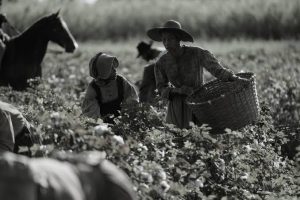
Peter in the Swamps
The first native intelligence during his escape is to go through the swamps, a difficult terrain, instead of the smooth horse trail which John opts for. He evades his assailants through the swamps but faced daunting tasks like having to fight and kill an alligator. His persistence, intelligence and courage, especially after finding out he killed an alligator astonished his white assailants who wondered how an African could be so intelligent. One of the white assailants tells Fassel “Our boy fixed (killed) a gator. How in the hell does an ignorant nigger got knowledge like that?”
Fassel replies; “You’re the ignorant one thinking like that. My father was a corn husker. My mother passed when I was young, so… the job of raising me fell on our nigger house girl. She took care of me. She fed me. She washed me. She taught me things… She was my friend. One evening… I asked my father if she could join us for supper, and he looked at me in a funny way and said, “Then what?” I said, “so we could eat together,” to which he asked, “Then what?” I didn’t know, I was just a boy. But he did. He said… “First they eat our food, then they’ll take our jobs and then they’ll steal our land. We give the nigger so much as crumbs, they’re going to take over the whole damn country.” I was so ashamed. I… I told him I’d been sneaking her food when she was hungry. He got real quiet… Called her into the dining room, picked up a dinner knife and… fixed her right there. Left her in the field to rot. Took her three days to die. Last thing she said was, “Why?” Hopped a train to St. Louis made my way down to Mississippi, found myself in this here swamp. And know what I saw? I saw niggers, just like her… running, hiding… surviving. People make ’em out to be ignorant, but far from it. in fact, what’s worse… is they tend to be persistent. So when one gets free, then another, then another, then another. And someday they run over the country and get to return the favour on us.”
Fassel’s statement shows that discrimination against blacks is informed either by ignorance or inferiority complex (xenophobia) on the part of the whites.
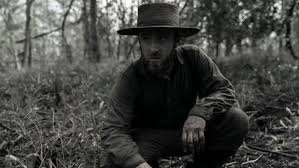
Peter and the Bees
The second native intelligence used by Peter is the use of honey to treat the wound he sustained while fighting the alligator. He arrives at a hut with burning coal and a tree housing bees. He closes up his wound with a hot knife and claimed with tree with a locally made pot loaded with smoke emitting coal to ward off the bees. He is able to pack honey from the tree top and applied to his wound. Peter earlier used mud from the mashy swamp to rob his face so as not to be stinged by bees.
Peter and Onions
Another native intelligence used by Peter to escape from Fassel and other assailants is the use of onions. Onion is an edible vegetable used to spice up food; perhaps based on his native knowledge he robs it on his body to prevent Fassel’s hounds from sniffing him out. He links up with John and once again advises him to rub the onions on his body but he (John) does not believe in the idea and attempted to again go his separate way believing in the protection of the gun he carries. John’s location is detected by the hounds and is killed by Fassel.
Peter, a Believer in God
Typical of an African, Peter piety is so strong that he calls on Him at every opportunity for help. Africans are a religious people and always anchor every situation on God. When Fassel reiterated to him at gun point at the border of Baton Rouge “I told you I was your God,” Peter looks into the eyes of the dying Fassel after being shot by Native Guards and told him “you are not my God.” Back at the construction site in Clinton, he told Thomas “God is with us,” an agonising John rebuked him “how can you say that to him? God is with us? Where is he? And why has he not set you free or has he? So you are not in these (chainss). Stand up and praise your God for all he has done for your, for all of us. You (Thomas). God is not with you. He is no where. And he sends that fool to tell us about his words, to be a good slave, to be obedient to your masters. Is that what God says to you? Peter replies “God says many things. I do not know why God shows himself to some people and not to others. But if you do not know him I will pray for you.” With his confidence, resilience and daring spirit he calls on God for hope.
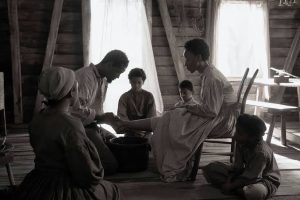
Two escapees who go through the swamp, Peter and Gordon, eventually make it to the Baton Rouge. The 1st Louisiana Native Guards at Baton eventually shoots Fassel dead and Peter taken to the army camp to be enlisted for the war against slave owners. Historically, it was at the camp that a picture of Peter’s back with raised welts and strafe marks crisscrossing was taken and used to further expose the evil of slavery. The picture went viral and became iconic as the campaign for the abolition of slavery intensified. After participating in the civil war victory, he reunited with his family.
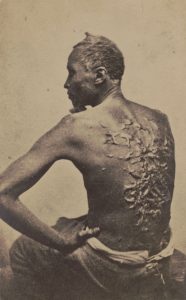
“Emancipation”, with the 2hours 12minutes duration, vividly reflects the dehumanising experience of blacks in slavery and the role of cultural identity in keeping the soul together and ultimately fighting for freedom. It tells the story of Africans as humans with perculiar traits; persistence, resilience and intelligence. Despite being produced in 2022, hundreds of years after the abolition of slavery, the props, setting, graphics, language and costumes give the audience the exact picture of how the era in discourse was.